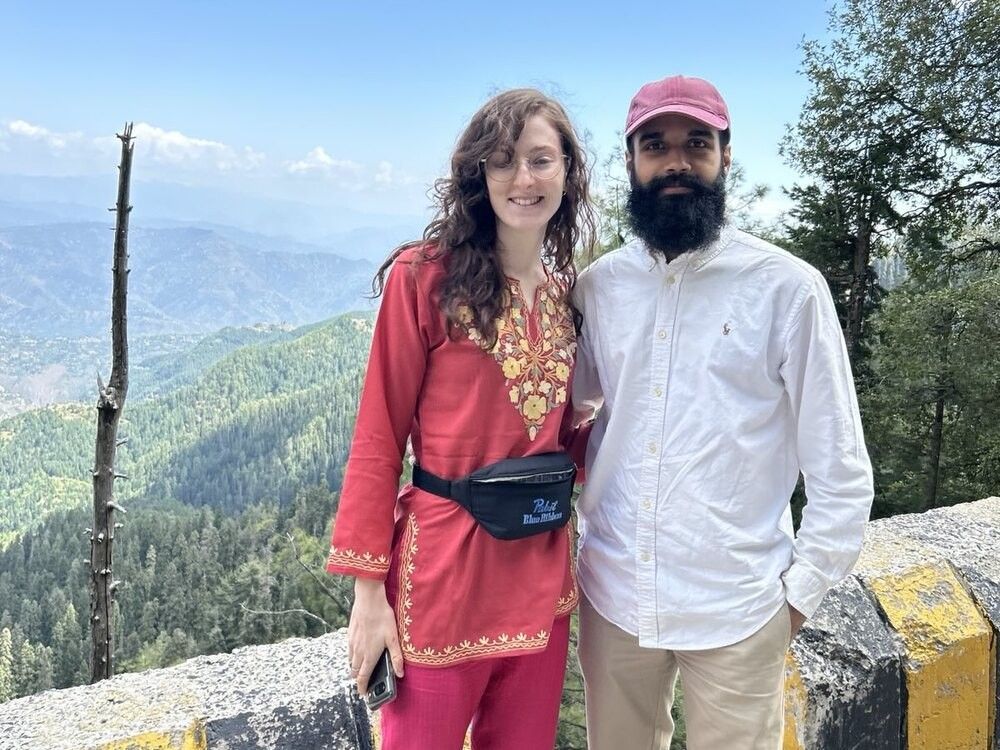
When climate activist Zain Haq was deported to Pakistan in January, his wife Sophia Papp followed.
Now she is back in Vancouver to plead with Canada’s new immigration minister, Lena Metlege Diab, to allow Haq to return while their spousal sponsorship application is processed.
“I am hoping the minister of immigration will bring Zain back on humanitarian and compassionate grounds,” said Papp, who is working in English Bay as a sailing instructor for the summer.
Days on the water with her students offer her precious moments of grace during what she calls “a lonely, unjust situation.”
A few weeks ago, a pod of orcas breached within sight.
“We saw a huge dorsal fin, as tall as a doorway, and baby orcas splashing and playing around it. It was this profound moment of unreality, that life could be so beautiful, and so perfect. We are so lucky to be here.”
She broke down in tears.
The tears were not just for what she has lost following her husband’s removal by Canada Border Services Agency, but for all that is precious and vulnerable to the ravages of climate change — everything her husband was trying to stand up for as a student activist.
“We are a Canadian family. He might not be technically Canadian yet, but it’s wrong to separate families for low-level charges for climate activism,” said Papp.
Haq, an SFU student in Vancouver on a study permit, had his student visa revoked by Canada Border Services Agency in 2022 after participating in acts of civil disobedience related to climate justice, which resulted in mischief charges.
The removal order was not based on the mischief charges, but on a claim Haq had violated his study permit by not progressing on his university degree.
SFU wrote a letter of support, and then-Immigration Minister Marc Miller intervened to grant Haq a six-month temporary residency permit.
The six-month reprieve was meant to allow him more time to apply for permanent residency through spousal sponsorship. The process dragged on, so Haq had to apply for an extension of the residency permit.
Although Haq applied before the deadline, and had a Fed Ex receipt to show it was mailed in time, Immigration, Refugees and Citizenship Canada said they had not received it. The couple’s spousal sponsorship application was rejected.
“I did not have due process to appeal,” said Papp. “The explanation by (Immigration Canada) was that there was an active removal order in place, but the only reason there was an active removal order was that they lost the (temporary residency permit). It was a Catch-22.”
Haq complied with the removal order on Jan. 26. Papp joined her husband, his parents and sister in Pakistan a month later.
“They welcomed me and treated me as a second daughter,” said Papp. Despite the warm embrace of Haq’s family, she struggled to adjust to life in Karachi.
“Pakistan is not a comfortable place for women, especially foreigners. So for security and safety reasons, I was not able to go by myself outside of the home. I was stuck inside most of the time,” said Papp.
Canada has a travel warning in place for Canadian women in Pakistan citing safety issues such as harassment, verbal abuse and gender-based violence.
Haq has found employment as an investigative journalist on the climate beat for The Express Tribune , writing about the destruction of habitat and farmland in the port of Keti Bandar, Pakistan’s energy crisis, and the impact of climate change on economic and socially vulnerable sectors.
“Regions in Pakistan and India are already experiencing some of the worst effects of this climate crisis — drought, or floods that have displaced millions of people,” said Papp.
Haq wasn’t deported for violence or serious criminal charges, but because of a clerical error, said Papp. He just wants to be back here with her, settle down and be a productive member of Canadian society.
The couple is applying for spousal sponsorship from outside of Canada, a process that can take years.
The normal questions that couples discuss with hope and excitement are exceedingly painful.
Will they ever have a home together? Will they ever be able to start a family?
“My home is in Canada,” said Papp. “He should be here with me.”
Postmedia reached out to the Immigration Canada, but it would not comment, citing privacy legislation.